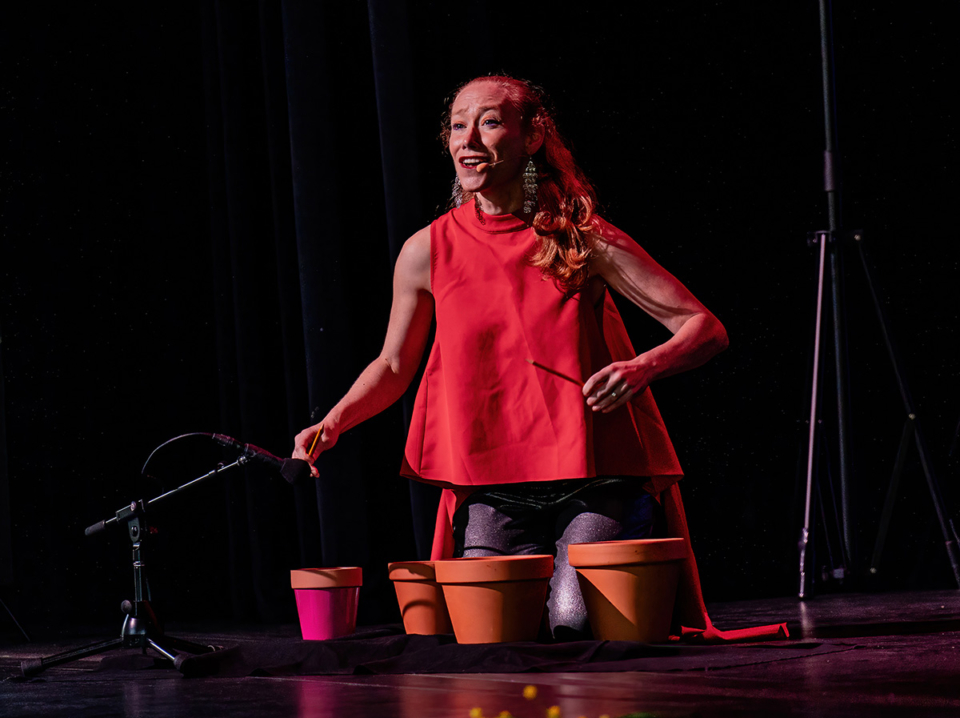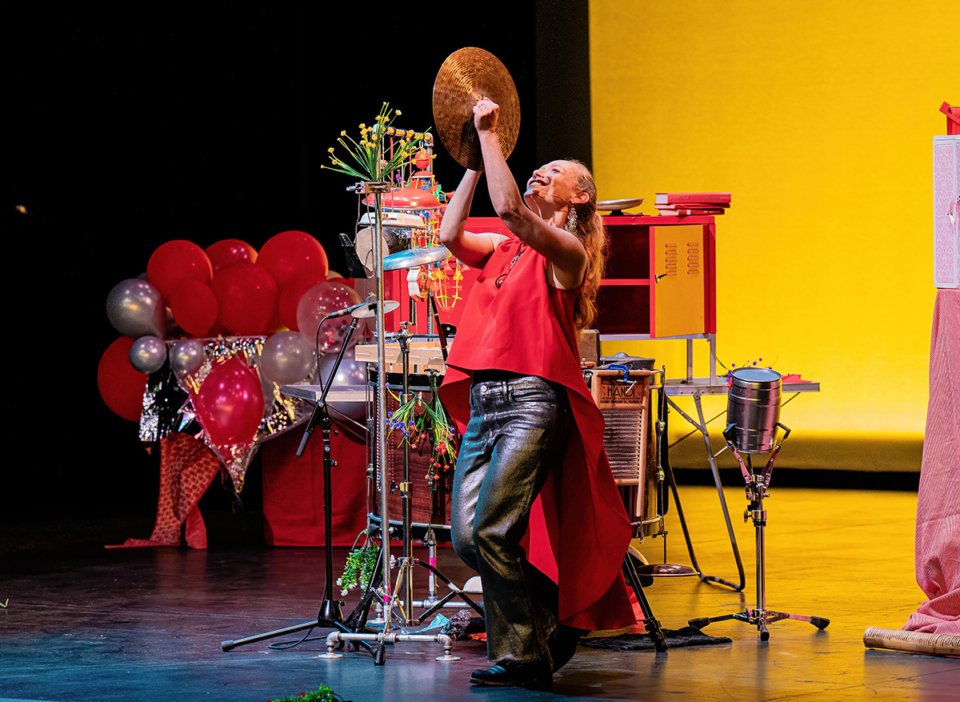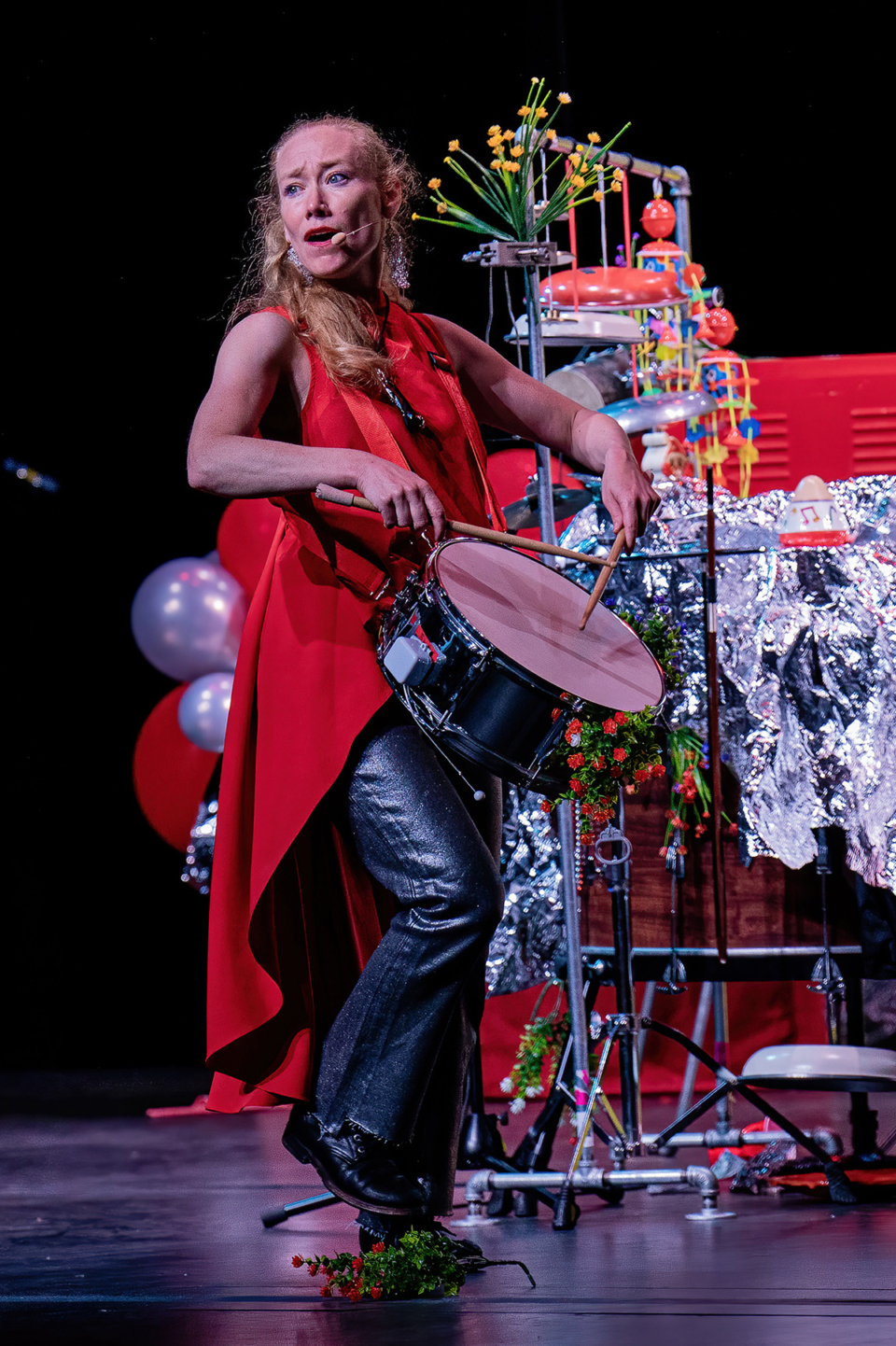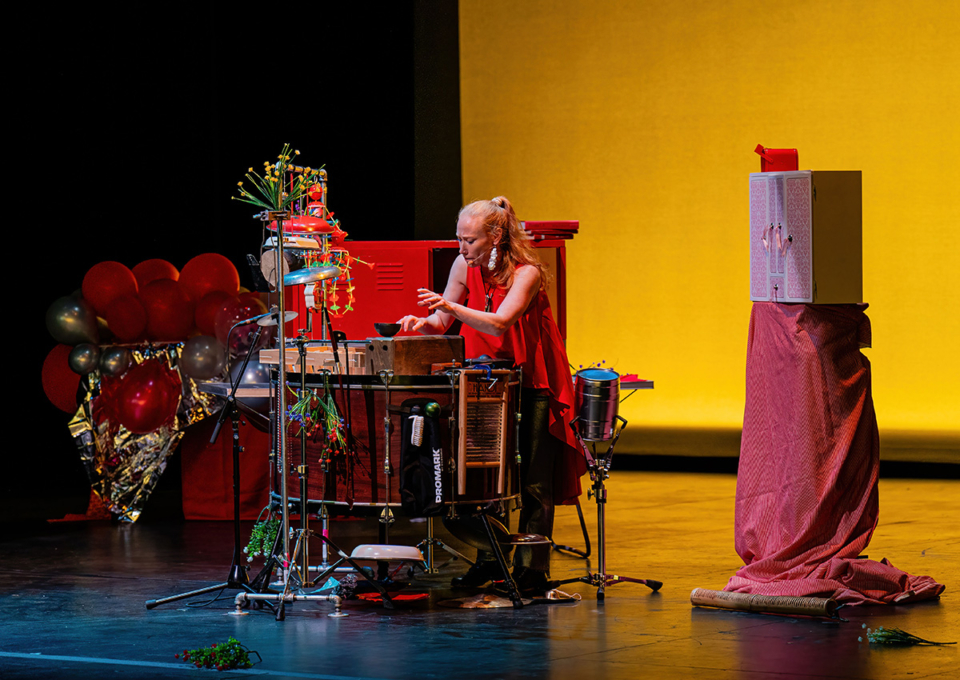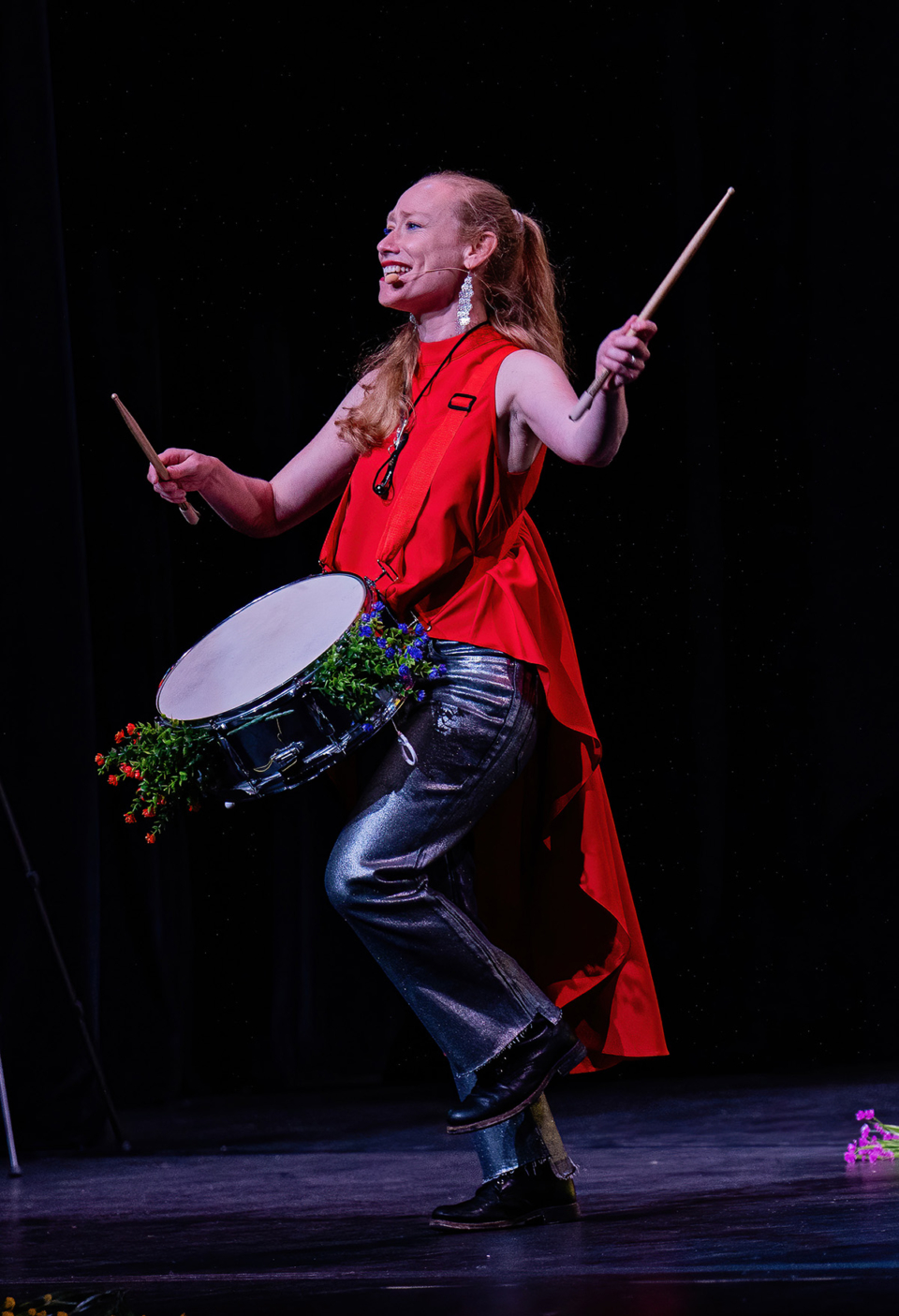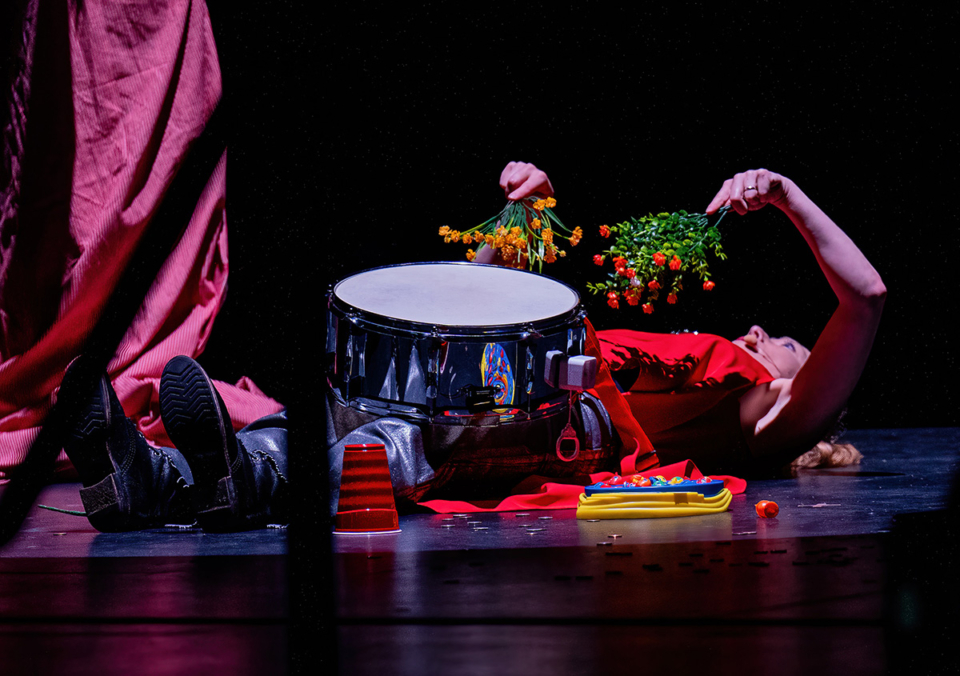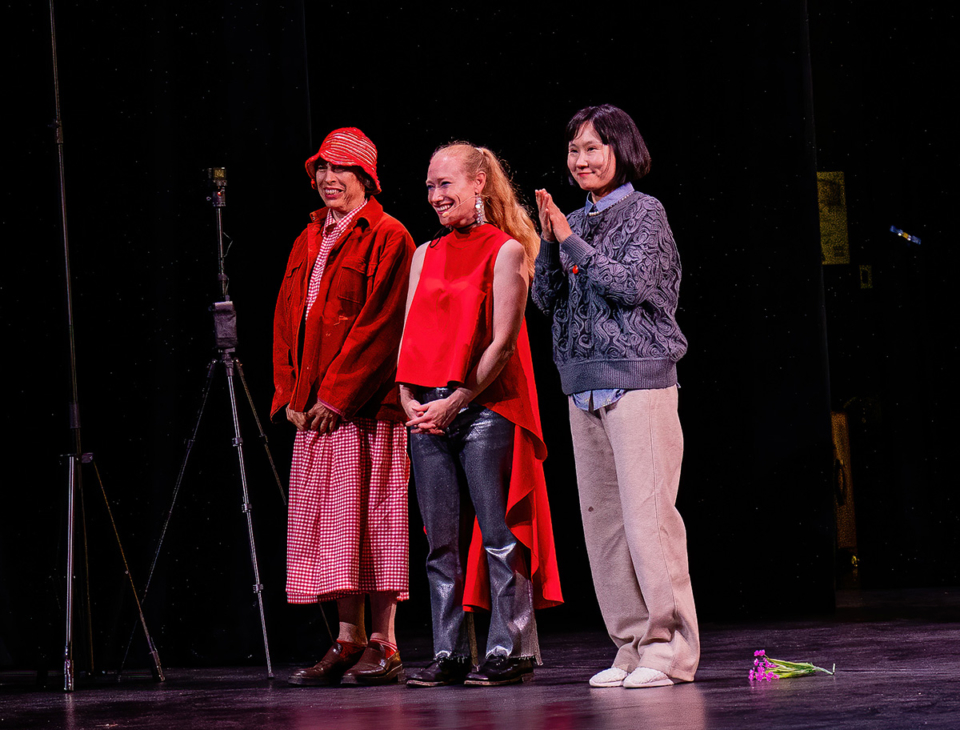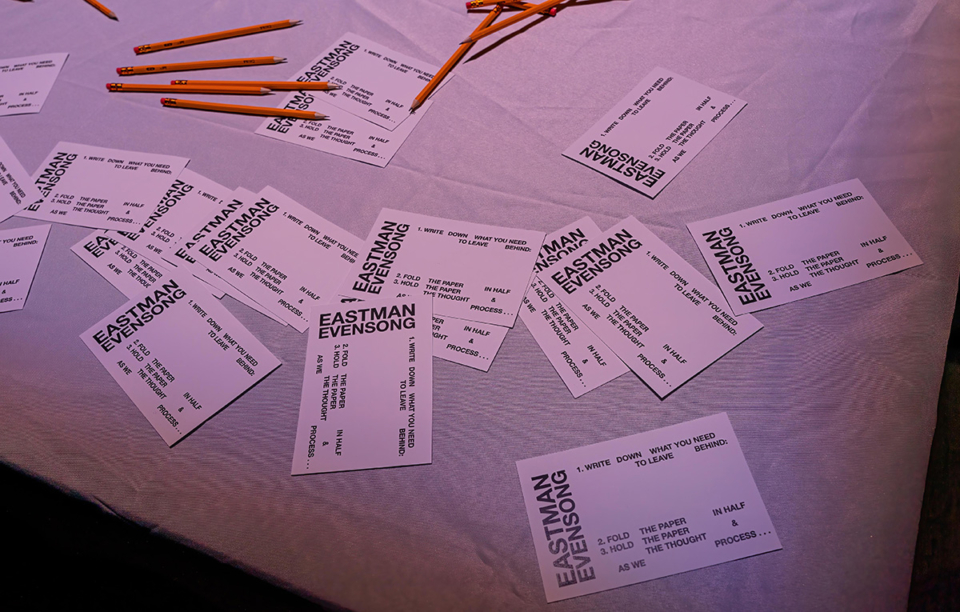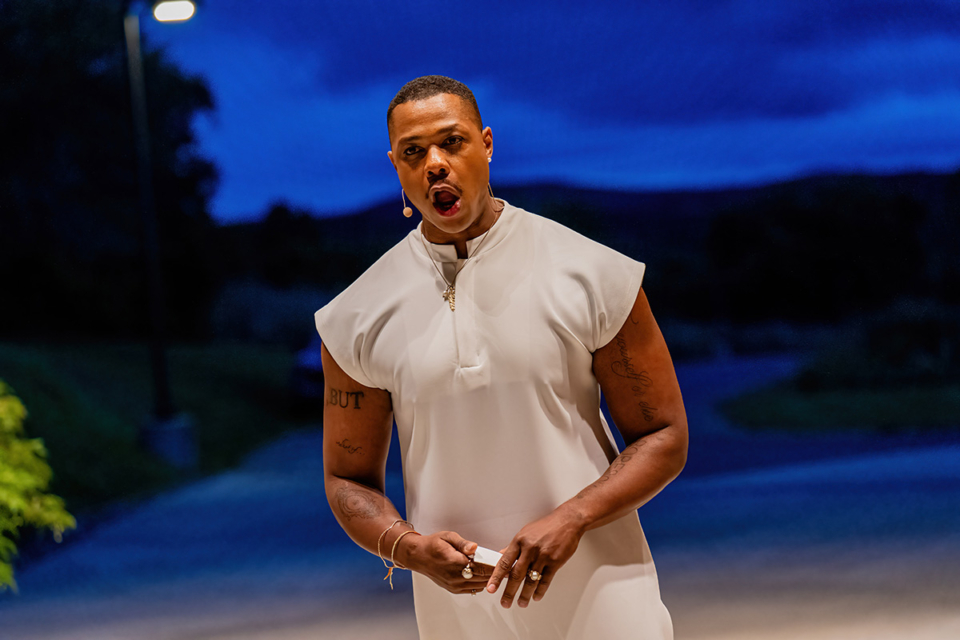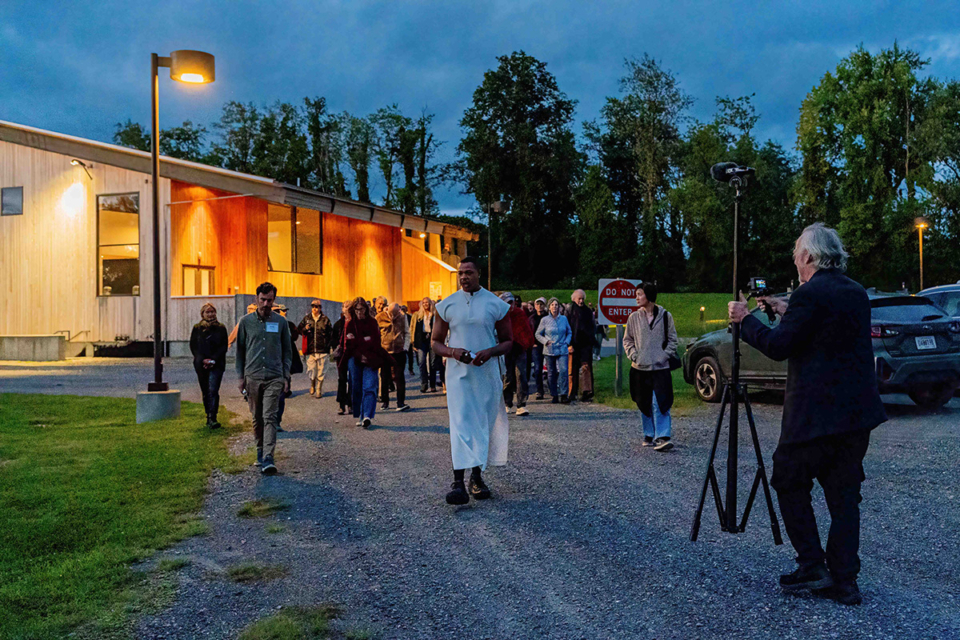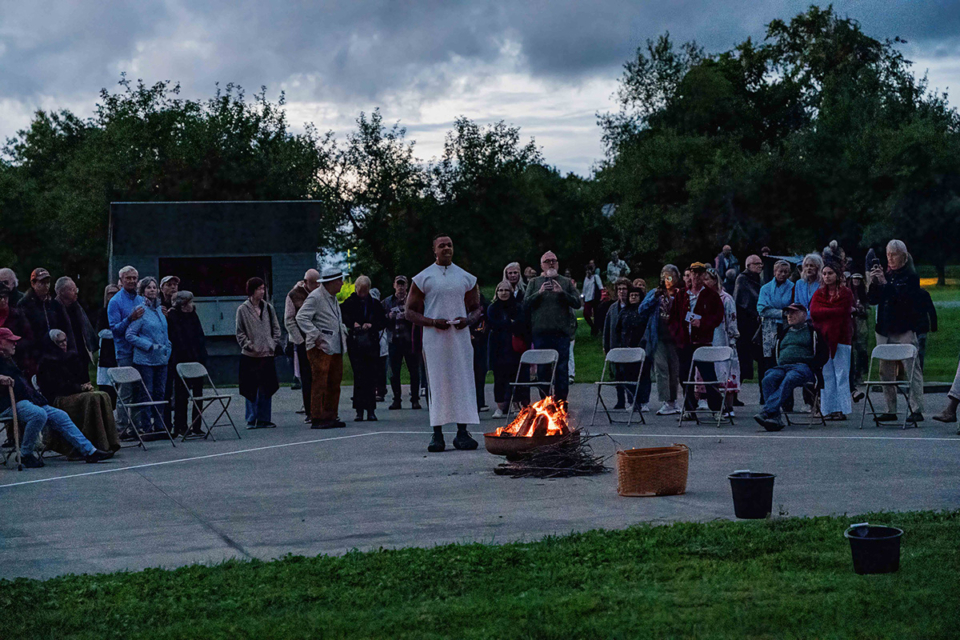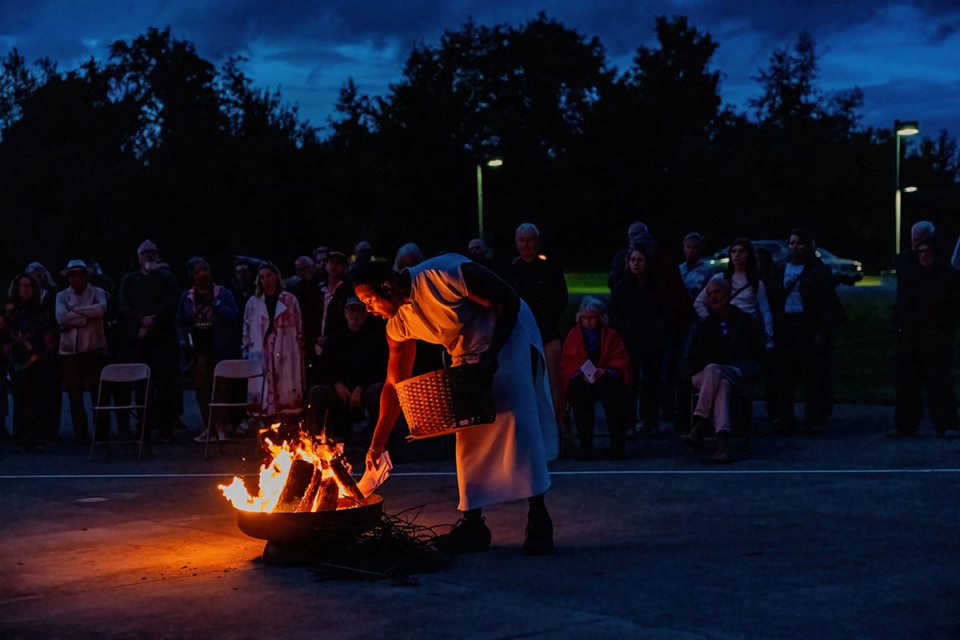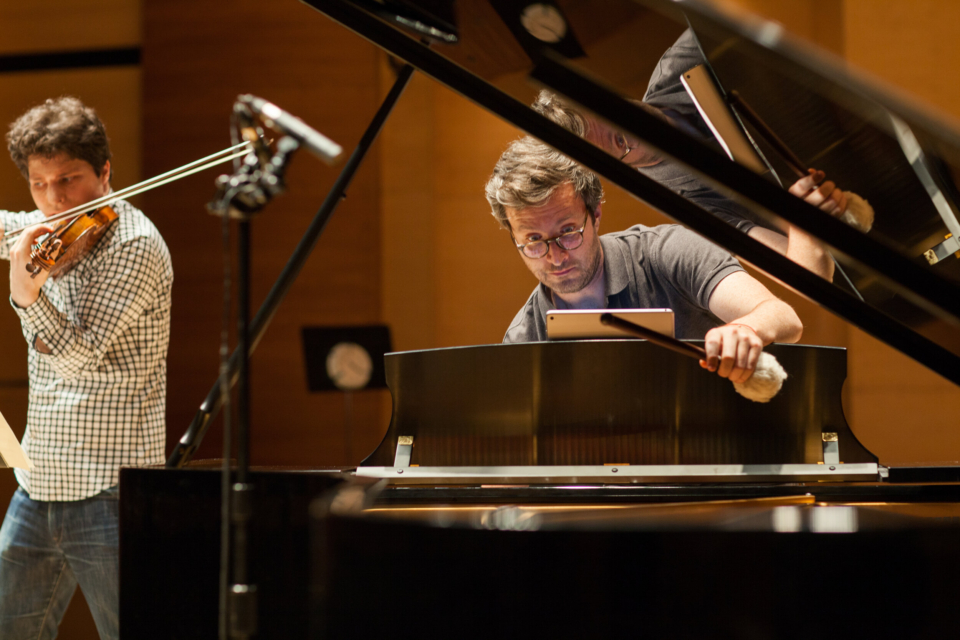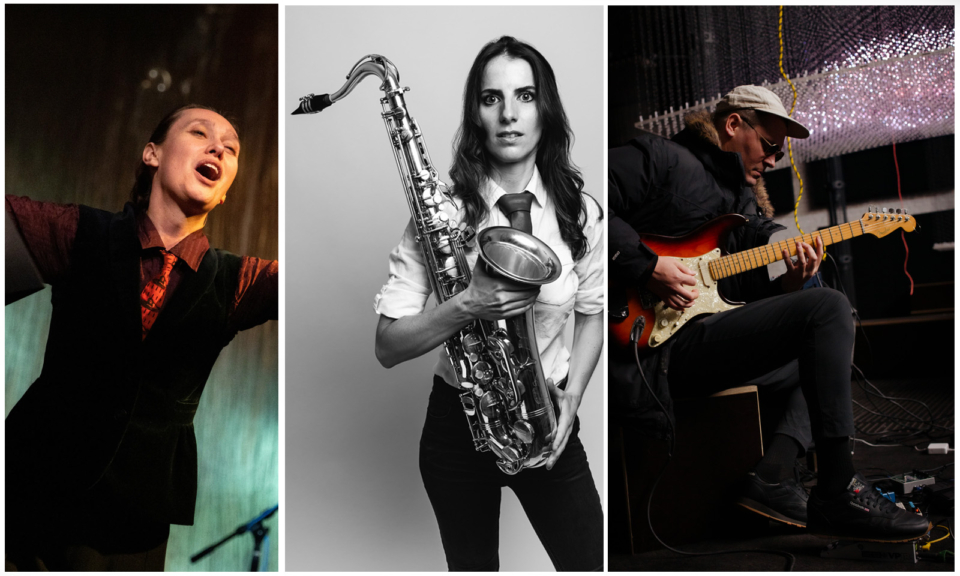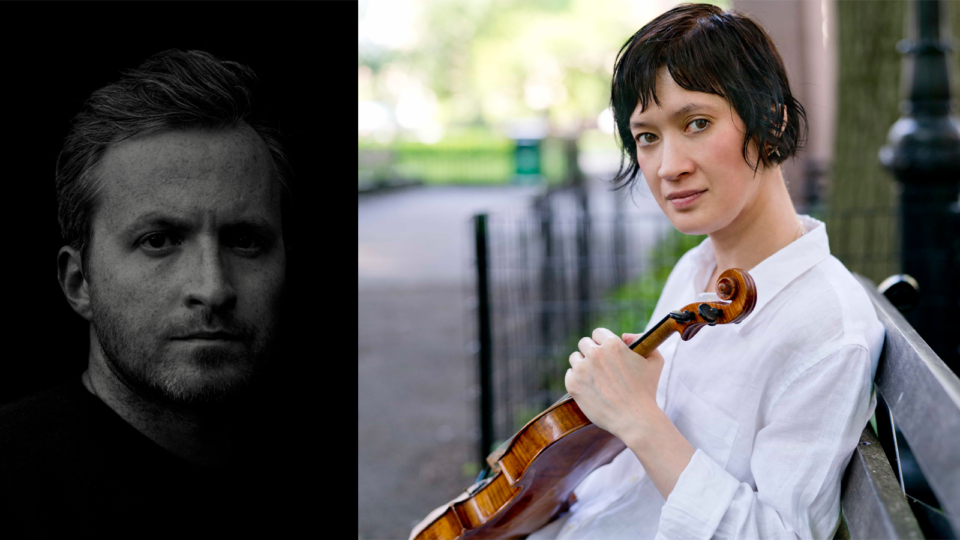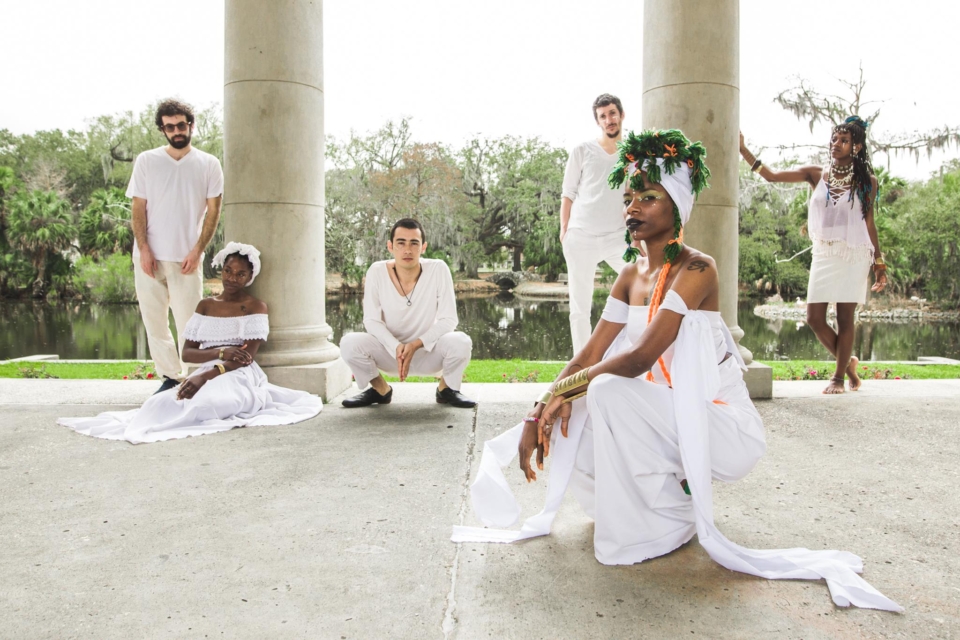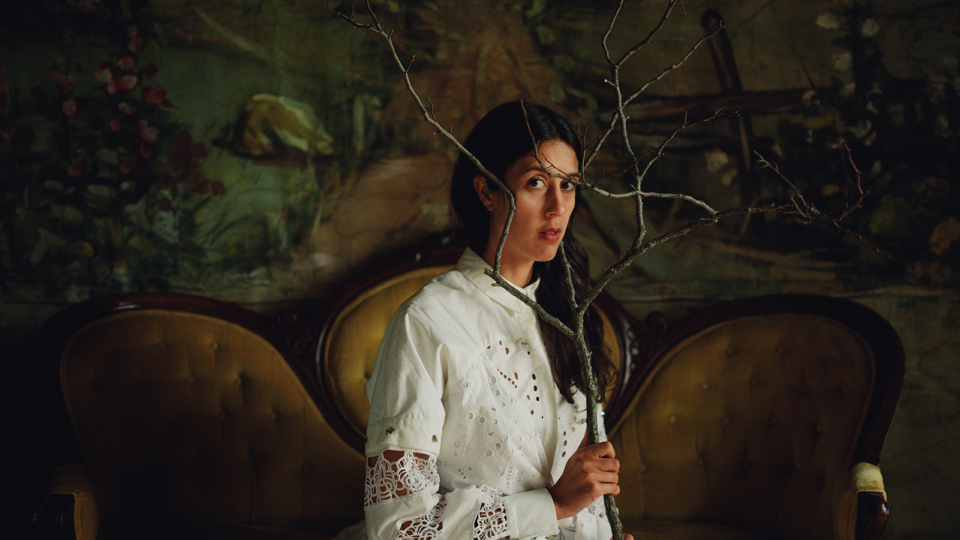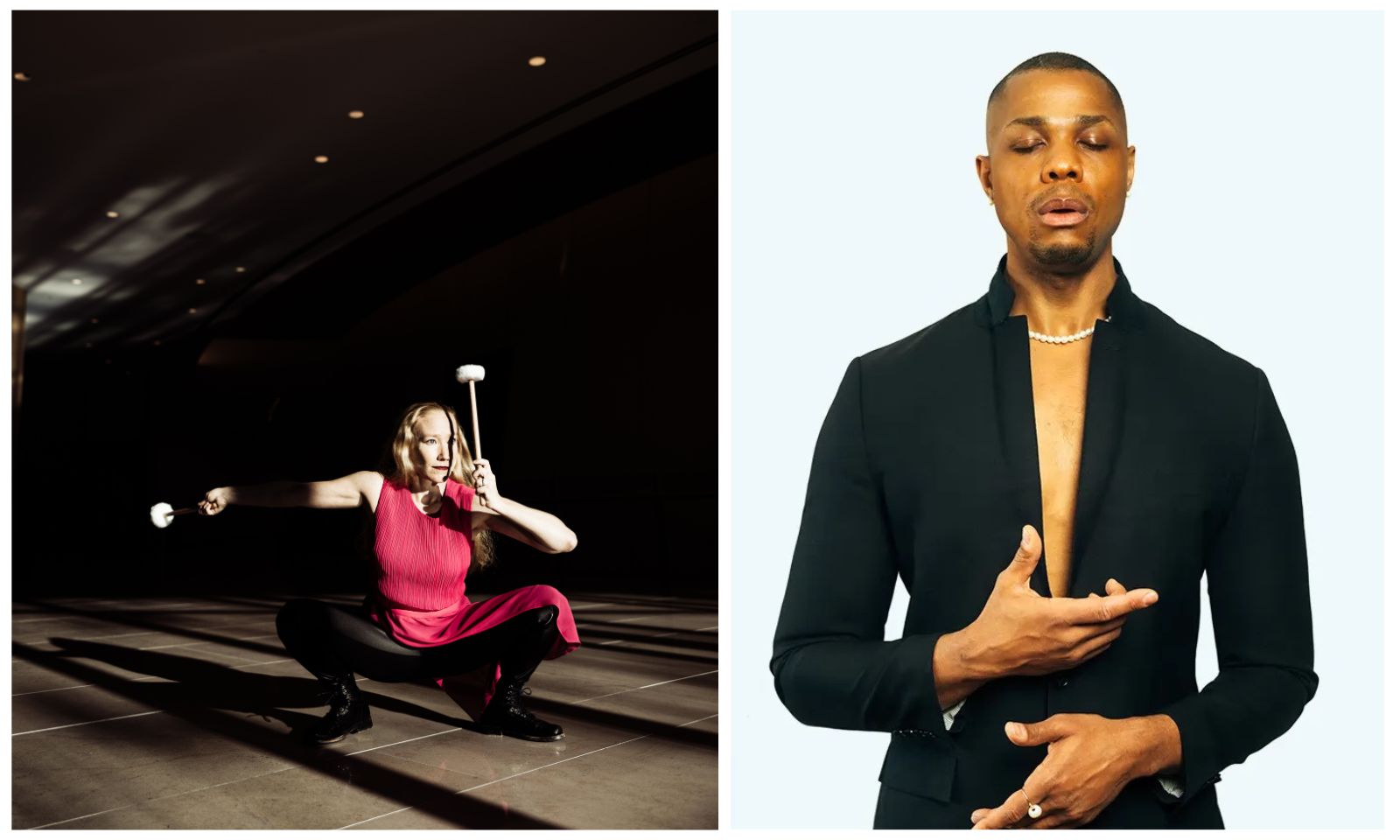
HOUSE BLEND IV:
A double bill: Bonnie Whiting performs Wang Lu‘s Stages for solo speaking/singing percussionist, with stage design by Polly Apfelbaum, and Frederic Rzewski‘s To the Earth for speaking percussionist and four flower pots. Plus bass-baritone Davóne Tines performing Eastman Evensong, a ceremony interweaving three solo vocal works by Julius Eastman: “Prelude to The Holy Presence of Joan D’Arc,” “The Lord has given, the Lord has taken,” and “O love, into thy bosom let me rest.”
Join us for a pre-concert talk with Bonnie Whiting, Wang Lu, Polly Apelfbaum, and David Garland, composer, multi-instrumentalist, and host of Spinning On Air, at Two Paul’s Cafe at 6:15 pm.
__________________
Wang Lu’s Stages (2023) for solo speaking/singing percussionist, performed by Bonnie Whiting, with stage design by Polly Apfelbaum, and Frederic Rzewski‘s To the Earth for speaking percussionist and four flower pots (text from the Homeric Hymn to Gaia, Mother of All) .
Wang Lu composed Stages collaboratively with Whiting, to a text adapted from Lucy Corin’s “Questions in Significantly Smaller Font,” in One Hundred Apocalypses and Other Apocalypses. Wang’s music incorporates urban environmental sounds, linguistic intonation and contours, traditional Chinese elements, and free improvisation, and Stages grew out of Wang and Whiting’s memories of confusion and struggle, Wang as a Communist Young Pioneer in China and Whiting caught between family and religious extremism. The work uncovers and explores hidden stages of consciousness, expressed through the sounds of urban environments, physical movement, vocal intonations, traditional Chinese music, recited and improvised texts, and contemporary instrumental techniques, with familiar objects—pot lids, infant music boxes, radios, SOLO cups, thermal sheets—deployed as musical instruments.
“If you want to be a percussionist in the 21st century, you’ve got to play a lot more than just drums. From flower pots to file racks and found objects, . . . if you can hit, shake, or strike it, it’s a percussion instrument. That’s what drew Bonnie Whiting to the big, wide world of contemporary percussion. . . . a sense of flexibility and possibility — finding music in everyday objects.” — Maggie Molloy, NPR Slingshot
A double bill with:
Bass-baritone Davóne Tines performing Eastman Evensong, a ceremony interweaving three solo vocal works by Julius Eastman: “Prelude to The Holy Presence of Joan D’Arc,” “The Lord has given, the Lord has taken,” and “O love, into thy bosom let me rest.”
“Davóne Tines is changing what it means to be a classical singer” — Alex Ross, The New Yorker
Bass-baritone Davóne Tines’s daring recitals stretch the boundaries of what classical music can be and the impact it has on audiences. In works such as Recital No. 1: MASS, he interweaves elements of the Catholic Mass by composers from J. S. Bach to Carolyn Shaw and his own experiences to explore themes of spirituality, justice, and identity. LA Times critic Marc Swed called him “one of the most powerful voices of our time, as mesmerizing as a singer can be. His voice can fill a space and then some, ringing gloriously.”
Among Tines’s thematic compositions are The Black Clown, a searing rumination on Black history and identity based on the Langston Hughes poem co-created with Michael Schachter, who wrote the rollicking musical-theater score, and VIGIL, in memory of Breonna Taylor, who was shot by police in her own home, a collaboration with fellow AMOC members pianist Conor Hanick and composers Igée Dieudonné and Matthew Aucoin.
Alex Ross called Tines’s performance of the Handel aria “Shake the Heavens” “one of those moments which anyone who attends concerts lives to witness: within thirty seconds, I knew I was in the presence of a major artist.”
Read more about Tines in The New York Times “A Pathbreaking Singer Arrives at the Met, With Pearls and Tattoos”
PS21 HOUSE BLEND programs are conceived for our theater with an eye toward bringing virtuosic and thoughtful musicians together in genre-defying combinations. The series opens a creative space unique to our venue, surroundings, and audiences that yields programs that can only be heard at PS21.
Enjoy all four exciting concerts for one low price with a House Blend Series Pass.
AUGUST 18, 5 pm – PS21 HOUSE BLEND I
Conor Hanick plays Johannes Brahms and Galina Ustvolskaya
AUGUST 19, 7 pm – PS21 HOUSE BLEND II: A double bill
Skylighght, Gelsey Bell (voice) & Erin Rogers (saxophone). Plus, composer/multi-instrumentalist Patrick Higgins (guitar, drums, electronics), improvisations on five tracks from Versus, his latest record
AUGUST 20, 7 pm – PS21 HOUSE BLEND III:
Miranda Cuckson (violin) & Conor Hanick (piano)
Iannis Xenakis: Mikka S.; J.S. Bach: Sonata in D minor (BWV 1004); Charles Ives: selections from Songs (Opus 114); Aaron Copland: Sonata for Violin and Piano
READ THE FULL HOUSE BLEND PRESS RELEASE
Bonnie Whiting performs, composes, improvises, and commissions new experimental music for percussion, seeking out projects that involve non-traditional notation, interdisciplinary performance, and the speaking percussionist. Her work centers on the relationship between percussive sound and the voice, explores the intersections of storytelling and experimental music and is often cross-disciplinary, integrating text, music, movement, and technology.
Bonnie lives and works in Seattle, WA, where she is Chair of Percussion Studies at the University of Washington School of Music. She attended Oberlin Conservatory (BM), the University of Cincinnati College-Conservatory of Music (MM), and the University of California San Diego (DMA.).
Bonnie’s performances include appearances at the John Cage Centennial Festival in Washington, DC, and solos with the National Orchestra of Turkmenistan and in Tan Dun’s Water Passion under the baton of the composer. She is a core member of the Seattle Modern Orchestra and the Torch Quartet, and she often collaborates today’s leading new music groups, including the International Contemporary Ensemble, Ensemble Dal Niente, red fish blue fish percussion group, eighth blackbird International Contemporary Ensemble, Talea Ensemble, Bang on a Can, Ensemble Dal Niente and the University of Washington’s new Intercontinental Experimental Ensemble.
She has also been a percussionist and vocalist with the Harry Partch Ensemble on the composer’s original instrumentarium, played in the premiere of the multimedia opera The Ritual of Breath Is the Rite to Resist, and collaborated with percussionist Jennifer Torrence, multimedia artist Afroditi Psarra, composer Eliza Brown, and ten incarcerated women on Through the Eyes(s), clarinetist James Falzone and pianist Lisa Cay Miller, played concertos with Northwest Sinfonietta, and regularly work on the Ritual of Breath project.
Her debut album, featuring an original solo-simultaneous realization of John Cage’s “45′ for a speaker” and “27’10.554″ for a percussionist”, was released by the Mode Records in 2017. Perishable Structures (2020), her second album, places the speaking percussionist in the context of storytelling and features her own music as well as works by Vinko Globokar, Frederic Rzewski, Richard Logan-Greene, and Susan Parenti.
Wang Lu, born in Xi’an, China, composes music that incorporates urban environmental sounds, linguistic intonation and contours, traditional Chinese elements, and free improvisation. A 2014 Guggenheim Fellow, her work has been performed by many orchestras and ensembles, including Nouvel Ensemble Moderne, the New York Philharmonic, the Chicago Symphony Orchestra, the Minnesota Orchestra, Boston Lyric Opera, the American Composers Orchestra, Orchestre National de Lille, Holland Symfonia, the International Contemporary Ensemble, Alarm Will Sound, Yarn/Wire, and The Crossing Choir. Festivals that have presented her music include the New York Philharmonic Biennial, Gaudeamus Music Week, Tanglewood, Cabrillo Music Festival, and Beijing Modern.
Wang’s Vanguard Emerging Opera Composer residency at the Chicago Opera Theatre (2020-22) culminated in the premiere of her full-length chamber opera The Beekeeper by the Chicago Opera Theatre. At the MacDowell Colony, she completed her orchestra piece Surge for the New York Philharmonic, composed a new string quartet for the Parker Quartet, and worked on a new piece for soprano and large ensemble for the Seattle Modern Orchestra that premiered in 2023. Her portrait albums Urban Inventory (2018) and An Atlas of Time (2020) were released to critical acclaim.
Assistant professor of music at Brown University, Wang earned her undergraduate degree at the Beijing Central Conservatory of Music and a doctorate in composition at Columbia University. In addition to her Guggenheim Fellowship, she has received the Berlin Prize in Music Composition from the American Academy in Berlin, the Wladimir and Rhoda Lakond Award in Music from American Academy of Arts and Letters, and the Koussevitzky Award from the Library of Congress.
Polly Apfelbaum is a Hudson Valley-based American artist whose kaleidoscopic works feature lively color, geometric forms, and non-representational subjects, incorporating textiles, clay, found objects, and other tactile elements traditionally associated with craft and domesticity. Best known for her self-described “fallen paintings,” composed of brightly dyed fabric pieces that are often strewn across the floor, the works blur the boundaries between installation, painting, and sculpture.
Born in 1955 in Abington, PA, Apfelbaum received her BFA from Tyler School of Art in Philadelphia in 1978. She had her first solo show in New York in 1986, and throughout the late 1980s and 1990s she contributed to a number of significant group exhibitions, including the integral “Sense and Sensibility: Women and Minimalism in the 90s” at The Museum of Modern Art. She has received a Joan Mitchell Grant, a Guggenheim Fellowship, and a Pollock Krasner Foundation Grant. Her work is included in the collections of The Museum of Modern Art, the Los Angeles County Museum of Art, and the Dallas Museum of Art.
“Fabric can never be totally controlled and is never the same. It has a mind of its own and is open to chance. I have always felt like an in-between artist, working in the space between painting and sculpture, between narrative and abstraction, between form and color, control and chance, beauty and not beauty.” — Polly Apfelbaum
Davóne Tines was born in Portsmouth, Virginia, in 1986 and grew up in Orlean, where he sang in the First Providence Baptist Church choir and played violin. At Harvard University, he majored in sociology, but also performed opera for the first time, as Nick Shadow in a student production of Stravinsky’s The Rake’s Progress. He also played violin in the Harvard-Radcliffe Orchestra, serving as the ensemble’s president, and sang in the Harvard-Radcliffe Collegium Musicum. After graduating, he was an intern at Cambridge’s American Repertory Theatre before becoming production manager of the opera program at George Mason University. He began voice lessons at George Mason and was a member of the choir at the Basilica of the National Shrine of the Immaculate Conception. In 2011 he studied voice with Cynthia Hoffmann at the Juilliard School, where he earned a master’s degree in 2013. He is now a guest lecturer at Harvard.
He came to international attention during the 2015–16 season when Peter Sellars cast him in the world-premiere performances of Kaija Saariaho’s Only the Sound at the Dutch National Opera, to wide critical acclaim. Almost immediately, Tines had engagements in Amsterdam, Helsinki, Paris, Madrid, and New York. Since then, he has premiered works by contemporary composers and directors including Terence Blanchard and Kasi Lemmons’s Fire Shut Up In My Bones, based on the memoir of New York Times op-ed columnist Charles M. Blow; John Adams and Peter Sellars’s Girls of the Golden West; Matthew Aucoin’s Crossing; and sang the title role in Anthony Davis’s 1986 X: The Life and Times of Malcolm X. He has also had leading roles in new productions of Stravinsky’s Oedipus Rex and Handel’s rarely staged Aci, Galatea, e Polifemo. He made his Metropolitan Opera debut in 2024, as the baritone in John Adams’s Nativity oratorio El Niño.
Among Tines’s numerous concert performances are John Adams’ El Niño, Kaija Saariaho’s True Fire, Schumann’s Das Paradies und die Peri, Stravinsky’s Oedipus Rex, Beethoven’s Ninth Symphony, and a program exploring the Music of Resistance by George Crumb, Julius Eastman, Dmitri Shostakovich, and Caroline Shaw.
He co-created The Black Clown with Michael Schachter, a music theater experience inspired by Langston Hughes poem, which premiered at the American Repertory Theater in 2018 and was presented by Lincoln Center in summer 2019. One year later, he created VIGIL, in memory of Breonna Taylor, who was shot by police in her own home, a collaboration with fellow AMOC members pianist Conor Hanick and composers Igée Dieudonné and Matthew Aucoin. Originally released as a music video, it has also been adapted for a concert format.
Davóne Tines is Musical America’s 2022 Vocalist of the Year and winner of the 2020 Sphinx Medal of Excellence, recognizing extraordinary classical musicians of color. In 2019 he was named as one of Time Magazine’s Next Generation Leaders. He is also the recipient of the 2018 Emerging Artists Award given by Lincoln Center for the Performing Arts. In 2024 he was awarded the Chanel Next Prize for his work as “a singer, creator and curator working in theatre and opera.”
Peter Sellars, whose casting of Tines in Kaija Saariaho’s 2016 chamber opera, Only the Sound Remains, catapulted the singer into stardom, has said, “The first time I heard Davóne, it was so clear that he sang because he had something to say, not simply because he has a beautiful voice. He grew up with a sense of music being not decorative but essential—deeply functional, serving a need, serving a range of needs. He knows that music is here to meet real human needs and real divine imperatives. And that’s really, really super different from the standard conservatory-trained opera singer.”
Julius Eastman (1940–1990) was a precocious pianist with a commanding bass voice. Born in Manhattan, he graduated from the Curtis Institute of Music in Philadelphia, where he studied with the revered pianist Mieczyslaw Horoszowski. At his graduation recital in 1963, he played only his own compositions. Although he later collaborated with John Cage, Morton Feldman, and other leading musical figures, in his 1966 New York solo debut, he performed a program that consisted mainly of his original work.
In 1970, Eastman was invited to teach at the State University of New York at Buffalo, where Lukas Foss presided over the Center of the Creative and Performing Arts, a hothouse of experimental music. His often performed his compositions there, work that breached the boundaries of the classical avant-garde, a mostly white and Eurocentric club. Although Eastman was shy, with few friends, through his composing he grew into a charismatic, uncompromising artist. His personal motto, he told the Buffalo Evening News in 1976, was “to be what I am to the fullest: Black to the fullest, a musician to the fullest, and a homosexual to the fullest.”
Despite Eastman’s success as composer and performer, including collaborations with Meredith Monk, Pierre Boulez, Zubin Mehta, and others, by the mid-1980s he became addicted to alcohol and drugs and was evicted from his East Village apartment. He died in a Buffalo, NY, hospital in 1990, just 49 years old and mostly forgotten. In recent years, however, a new generation of musicians has rediscovered his work, which is now widely performed and recorded. Christopher Rountree, founder and artistic director of LA-based Wild Up, which recorded Eastman’s 1974 Femenine, explains its appeal: “The most remarkable thing about Julius’ music is its ability to send musicians closer to themselves, to force agency on them, and pull their insides out,” Rountree says. “His pieces inspire creativity, in a totally singular way.”
David Garland will introduce Julius Eastman’s life and music. A composer and multi-instrumentalist, Garland is the producer and host of Spinning On Air, the music and interview show that was a feature of WNYC for 28 years and is now a podcast. In 1984, he interviewed Juius Eastman, who also recorded a rare solo vocal performance on the program. Listen to the interview and performance here.


